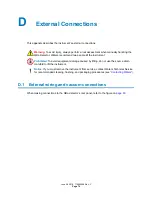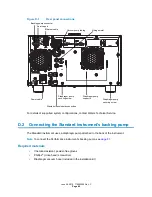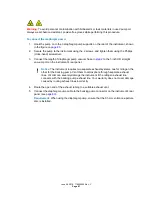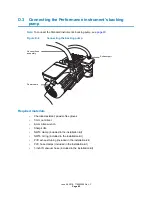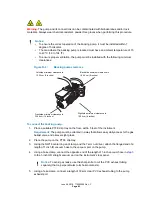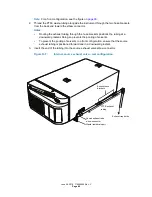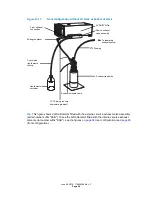
June 28, 2016, 715003956 Rev. C
Page 85
To make the electrical connections to the rotarybacking pump:
1.
Connect the pump control cable from the pump switching box to the backing pump
connector on the instrument’s rear panel.
2.
Connect the rotarybacking pump power cord to the pump switching box.
3.
Connect the pump switching box power cord to the main power source, and use the power
switch on the pump to power it on.
Tip:
The relay box allows the instrument to remotely control the backing pump.
D.4
Connecting to the nitrogen gas supply
Required materials
•
Chemical-resistant, powder-free gloves
•
Sharp knife
•
Wrench
•
6-mm PTFE tubing (included in the installation kit)
•
6-mm stud
•
Nitrogen regulator
To connect the nitrogen gas supply:
1.
Use the sharp knife to cut a length of 6-mm PTFE tubing long enough to connect the rear of
the instrument to the nitrogen regulator.
2.
Connect one end of the 6-mm PTFE tubing to the nitrogen inlet port on the rear of the
instrument (see
3.
Attach the nitrogen regulator to the nitrogen supply.
4.
Install the 6-mm stud into the regulator outlet.
5.
Connect the free end of the long piece of 6-mm PTFE tubing to the 6-mm stud.
Requirement:
The nitrogen must be dry and oil-free, with a purity of at least 95%. Regulate
the supply at 600 to 690 kPa (6.0 to 6.9 bar, 87 to 100 psi).
Requirement:
Wear clean, chemical-resistant, powder-free gloves when connecting the
nitrogen gas supply.
Notice:
To avoid gas leaks, use the sharp knife to cut the PTFE tubing squarely (that is,
perpendicular to its horizontal axis).
TP01742









